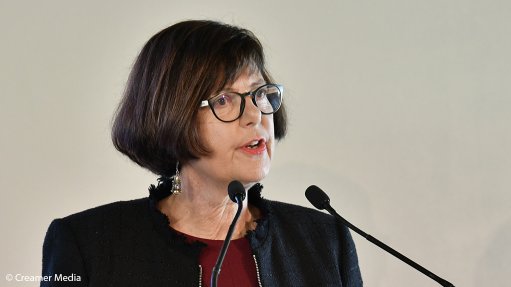
Forestry, Fisheries and the Environment Minister Barbara Creecy
Photo by: Creamer Media's Donna Slater
Forestry, Fisheries and the Environment Minister Barbara Creecy has called on the developed countries to ensure access to long-term, predictable and affordable climate finance for developing countries.
Creecy participated in a July Climate Ministerial meeting hosted in London, in the UK, this week by the United Nations Framework Convention on Climate Change COP26 president-designate, Alok Sharma.
The COP26 negotiations will take place in Glasgow, Scotland, in November and the UK COP presidency has set keeping the critical 1.5 oC temperature rise limit alive as its key goal for the negotiations.
The London event included more than 50 Ministers in the first face-to-face meeting of its kind in more than 18 months.
Participants heard that the emerging markets required an estimated $3- to 4-trillion yearly in low-carbon investments over the next 15 years to implement the emission-reduction commitments outlined in their updated Nationally Determined Contributions.
Developed countries have previously pledged $100-billion a year, from 2020 through to 2025, to support developing countries with their climate mitigation investments.
This funding commitment has been central to the climate accords since 2009 and developing countries consider it essential for securing progress and meeting the goals of the Paris Agreement of 2015.
Creecy said in a statement that to restore and maintain trust and transparency it was “imperative” for COP26 to assess whether the goal had been achieved.
In addition, deliberations should begin on a “clear road map” outlining milestones towards setting a new, more ambitious, mobilisation goal.
She proposed that developed countries commit to a new collective goal of jointly mobilising $750-billion dollars a year by 2030, from a “floor of $100-billion”, considering the needs and priorities of developing countries.
This funding should come from a wide variety of sources, including public and private, bilateral and multilateral, as well as alternative finance sources.